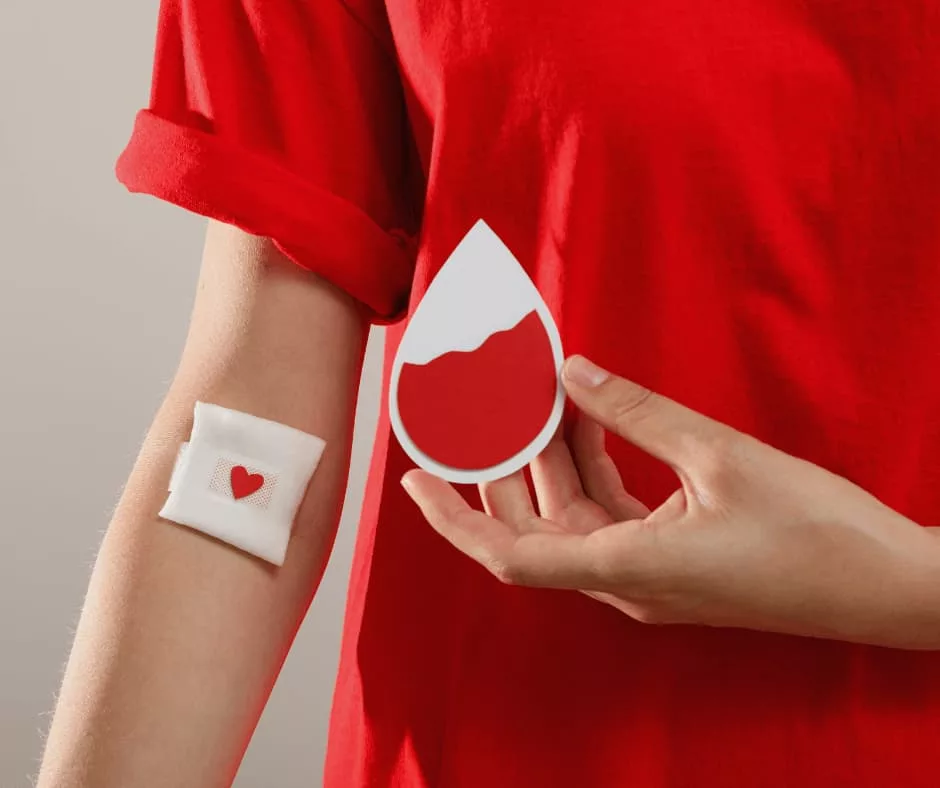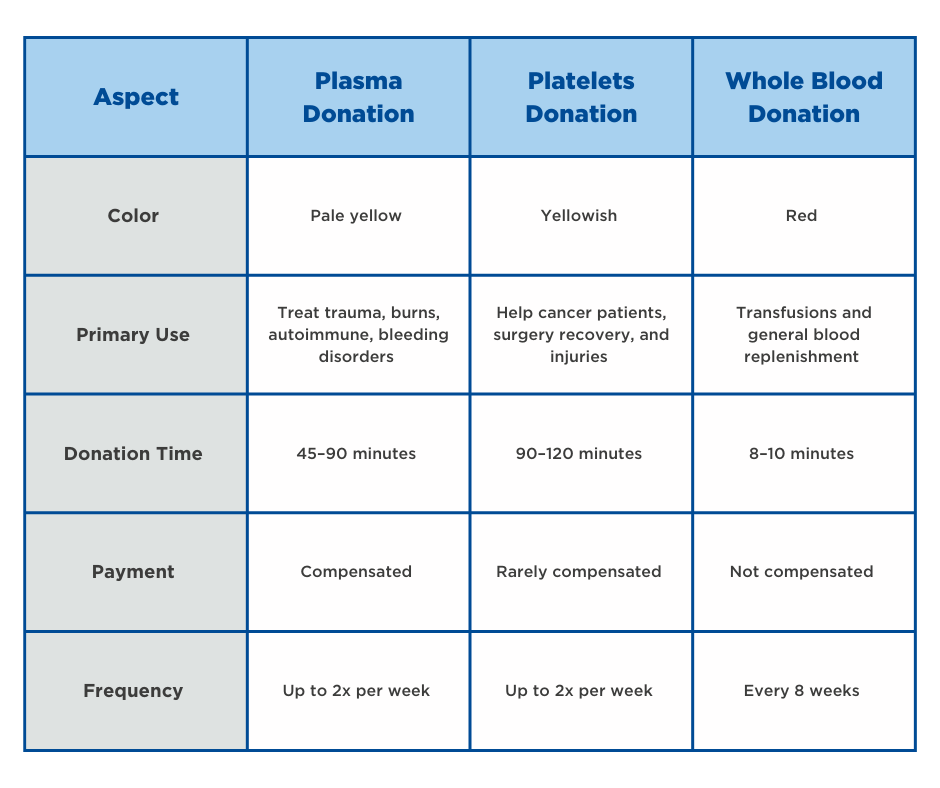
If you’ve been considering donating plasma, platelets, or whole blood, you may be asking, “What’s the difference between the three?” Plasma, platelets, and whole blood all play vital roles in saving lives, but they serve distinct functions in the body and in medical treatments. Understanding these differences can help you make an informed decision about which type of donation is right for you.
This guide will explain:
- What is plasma, platelets and whole blood?
- The similarities and differences between donating plasma, platelets, and whole blood.
By the end, you’ll have everything you need to determine which donation option aligns with your goals to save lives and support your community.
Plasma in Comparison
Plasma, the liquid component of your blood, makes up about 55% of its overall content. It is a pale, yellow fluid that serves as a transport system, carrying vital nutrients, hormones, and proteins throughout your body. Plasma is commonly referred to as “the gift of life” because it’s used to create life-saving medications and treatments for chronic illnesses.
Functions of Plasma
- Carries antibodies, hormones, and nutrients
- Helps regulate blood pressure and volume
- Contains proteins essential for blood clotting and immune defense
Plasma is used to treat a wide range of conditions, including severe burns, trauma, autoimmune disorders, and hemophilia. Unlike platelets, plasma can be frozen and stored, making it a valuable resource for long-term medical use.
What Are Platelets?
Platelets are tiny blood cells that help your blood clot, stopping bleeding and aiding in wound healing. Often called “lifesavers,” platelets are crucial for patients undergoing treatments like chemotherapy, recovering from major surgeries, or facing traumatic injuries.
Functions of Platelets
- Form clots to prevent excessive bleeding
- Support recovery from surgeries and injuries
- Help treat certain blood disorders
Platelets have a very short shelf life—only about 5-7 days—so donations are constantly needed to restock hospital supplies. If you choose to donate platelets, your blood is drawn and passed through a machine that extracts your platelets, while your red blood cells and plasma are returned to your body.
What is Whole Blood?
Whole blood is the complete, unseparated form of blood that flows through our bodies, composed of red blood cells, white blood cells, platelets, and plasma. It is collected during blood donations and used in its entirety or separated into components for specific medical treatments.
Components of Whole Blood
- Red Blood Cells: Transport oxygen to tissues and remove carbon dioxide.
- White Blood Cells: Support the immune system by fighting infections and diseases.
- Platelets: Help with blood clotting to stop bleeding.
- Plasma: The liquid portion that carries nutrients, hormones, and proteins.
Whole blood plays a crucial role in emergency trauma care, surgeries, and restoring blood volume after significant blood loss. Its versatility makes it a vital resource, but it must be transfused within 24 hours of donation or separated into components for longer storage and targeted use.
Similarities Between Plasma Donation, Platelets Donation, and Whole Blood Donation
Plasma, platelet, and whole blood donations share some common processes and requirements. Here’s a quick overview of what they have in common:
- Eligibility Requirements: All donors must meet basic age, weight, and health criteria, such as being 18-70 years old and weighing at least 110 pounds. Here is more information on plasma donation eligibility requirements.
- Screening Process: Each donation begins with a health screening, including checking your blood pressure, weight, and hematocrit levels.
- Donation Process: A needle is inserted into your arm to draw blood, and for plasma or platelets, the required component is separated using a specialized machine while the rest of your blood is returned to your body.
- Legal and Regulatory Standards: Donations in the U.S. are regulated by the FDA to ensure safety and quality.
Differences Between Plasma Donation, Platelets Donation, and Whole Blood Donation
Below is a breakdown of the major differences across these donation types to help you decide which option fits your goals:
Color of the Donation:
- Plasma: Pale yellow
- Platelets: Yellowish
- Whole Blood: Red
Primary Use of Donations:
- Plasma: Treats trauma, burns, autoimmune and bleeding disorders
- Platelets: Helps cancer patients, post-surgery recovery, and injury treatment
- Whole Blood: Used for transfusions and general blood replenishment
Donation Time:
- Plasma donations usually take 45–90 minutes
- Platelets donations take 90–120 minutes
- Whole Blood donations take 8–10 minutes
Payment or Compensation for Donations:
- Plasma: Typically compensated
- Platelets: Rarely compensated
- Whole Blood: Not compensated
Frequency – How Often Can You Donate?:
- Plasma can be donated up to 2 times per week
- Platelets can be donated up to 2 times per week
- Whole Blood can be donated every 8 weeks
Does Donating Plasma Lower Your Platelet Count?
No, donating plasma does not lower your platelet count. During a plasma donation, your platelets, red blood cells, and other blood components are returned to your body. This means plasma donation has minimal impact on your overall blood composition, including your platelet levels.
Final Thoughts on Plasma Donation vs Platelets Donation vs Whole Blood Donation
Whether you choose to donate plasma, platelets, or whole blood, your contribution can save lives and make a lasting impact. Plasma donors, in particular, help create life-saving medications for people with chronic illnesses who depend on these treatments for survival.
It’s important to be aware of the deferral periods when donating different types of blood products. If you’ve recently donated whole blood or platelets, you’ll need to wait before donating plasma. Generally, the deferral period for donating plasma after whole blood is around 8 weeks, while after donating platelets, the wait time is usually around 7 days. These guidelines ensure your body has enough time to replenish and recover. Always check with your donation center for specific requirements and recommendations.
Donate plasma today and earn while you help save lives. Learn more about the benefits of donating plasma and find a plasma donation center near you to get started!








